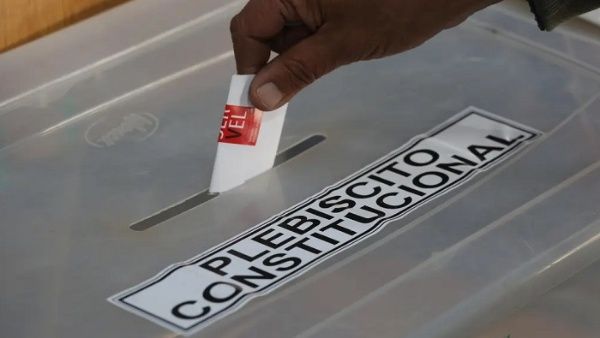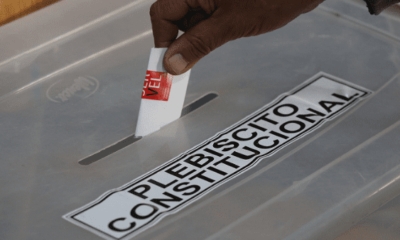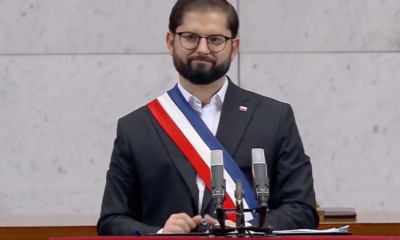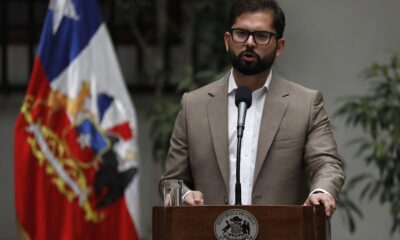International
Chilean television advertising slots close ahead of the plebiscite

December 15 |
On Thursday ended in Chile the period conceived to display electoral propaganda regarding the constitutional proposal that will be submitted to plebiscite next Sunday, December 17, when Chileans will decide the future of the text drafted by the Constitutional Council.
On December 17, voters will receive a ballot with the following question: Are you for or against the text of the New Constitution? Two options will then appear, in favor of the proposal or against it, for voters to choose the one they prefer.
If the constitutional project is not accepted, the Law of Laws that came into force in 1980, conceived under the military dictatorship of General Augusto Pinochet (1973-1990), will remain in force.
In October 2022, a plebiscite was held on the proposed Magna Carta prepared by the Constitutional Convention, at which time the “Rejection” option won.
The process is organized by the Electoral Service of Chile (Servel). According to a pre-electoral report made public by the entity, the electoral roll is made up of 15,262,012 people at national level and 127,546 residents abroad.
The agency also detailed that 676,028 foreigners residing in Chile (with at least five years of residence, 18 years of age and without crimes) registered to participate.
On Saturday, December 16, the polling stations will be constituted and their spokespersons will be trained. The following day, the polling stations will open from 08H00 to 18H00 local time. These may be constituted with at least three members and, if they are to remain open beyond 18H00, they will do so until there are no voters left in line who wish to vote.
Voters only need their identity card to vote. This document must be valid, although ID cards that have expired after January 1, 2020 will be accepted. Voters with any type of disability will be able to access the assisted voting option.
According to the current law, voting is mandatory for those who are registered in the electoral roll and reside in Chile. For those who vote from abroad, it is voluntary.
Chileans who are more than 200 km away from their electoral domicile, are absent from the country or suffer from an illness are excluded from the obligation to vote. Those who are far from their electoral district must -among other requirements- go to the nearest Carabineros Police Station, obtain a certificate and then submit it to a judge when summoned.
Any other impediment for not voting can also be certified, but the seriousness of this cause will be certified by a judge according to the evidence presented by the citizen.
Those who do not vote may be fined from 0.5 to 3 monthly tax units (UTM), that is, from 32,108 pesos to 192,648 pesos (US$36-215).
Chile applies a dry law period. This will start on December 17 at 05H00 and will last until 20H00 local time (two hours after the electoral closing time).
In addition, those commercial establishments that are not attended by their owners will be closed, since election days are declared holidays for workers in this sector. Those who work providing essential services and do not have time off, will receive a two-hour leave to vote.
International
U.S. Senate Rejects Budget, Bringing Government Closer to Shutdown Amid DHS Dispute

The U.S. Senate voted on Thursday against a budget proposal in a move aimed at pressuring changes at the Department of Homeland Security (DHS), following the killing of two civilians during a deployment of immigration agents in Minneapolis.
All Senate Democrats and seven Republican lawmakers voted against the bill, which requires 60 votes to advance, pushing the country closer to a partial government shutdown that would cut funding for several agencies, including the Pentagon and the Department of Health.
The rejection came as Senate leaders and the White House continue negotiations on a separate funding package for DHS that would allow reforms to the agency. Proposed measures include banning Immigration and Customs Enforcement (ICE) agents from wearing face coverings and requiring them to use body-worn cameras during operations.
The vote took place just hours after President Donald Trump said he was “close” to reaching an agreement with Democrats and did not believe the federal government would face another shutdown, following last year’s record stoppage.
“I don’t think the Democrats want a shutdown either, so we’ll work in a bipartisan way to avoid it. Hopefully, there will be no government shutdown. We’re working on that right now,” Trump said during a Cabinet meeting at the White House.
International
Trump Says Putin Agreed to One-Week Halt in Attacks on Ukraine Amid Extreme Cold

U.S. President Donald Trump said on Thursday that he secured a commitment from Russian President Vladimir Putinto halt attacks against Ukraine for one week, citing extreme weather conditions affecting the region.
“Because of the extreme cold (…) I personally asked Putin not to attack Kyiv or other cities and towns for a week. And he agreed. He was very pleasant,” Trump said during a Cabinet meeting broadcast by the White House.
Trump acknowledged that several advisers had questioned the decision to make the call.
“A lot of people told me not to waste the call because they wouldn’t agree. And he accepted. And we’re very happy they did, because they don’t need missiles hitting their towns and cities,” the president said.
According to Trump, Ukrainian authorities reacted with surprise to the announcement but welcomed the possibility of a temporary ceasefire.
“It’s extraordinarily cold, record cold (…) They say they’ve never experienced cold like this,” he added.
Ukrainian President Volodymyr Zelensky later commented on the announcement, expressing hope that the agreement would be honored.
International
Storm Kristin Kills Five in Portugal, Leaves Nearly 500,000 Without Power

Storm Kristin, which battered Portugal with heavy rain and strong winds early Wednesday, has left at least five people dead, while nearly half a million residents remained without electricity as of Thursday, according to updated figures from authorities.
The revised death toll was confirmed to AFP by a spokesperson for the National Emergency and Civil Protection Authority (ANPEC). On Wednesday, the agency had reported four fatalities.
Meanwhile, E-Redes, the country’s electricity distribution network operator, said that around 450,000 customers were still without power, particularly in central Portugal.
Emergency services responded to approximately 1,500 incidents between midnight and 8:00 a.m. local time on Wednesday, as the storm caused widespread disruptions.
The Portuguese government described Kristin as an “extreme weather event” that inflicted significant damage across several regions of the country. At the height of the storm, as many as 850,000 households and institutions lost electricity during the early hours of Wednesday.
Several municipalities ordered the closure of schools, many of which remained shut on Thursday due to ongoing adverse conditions.
Ricardo Costa, regional deputy commander of the Leiria Fire Brigade, said residents continue to seek assistance as rainfall persists.
“Even though the rain is not extremely intense, it is causing extensive damage to homes,” he noted.
In Figueira da Foz, a coastal city in central Portugal, strong winds toppled a giant Ferris wheel, underscoring the severity of the storm.
-

 International3 days ago
International3 days agoU.S. Senate Rejects Budget, Bringing Government Closer to Shutdown Amid DHS Dispute
-

 International4 days ago
International4 days agoFootball Fan Killed in Clashes After Colombian League Match
-

 Central America4 days ago
Central America4 days agoGuatemala President Says Starlink Terminal Found Inside Prison
-

 International4 days ago
International4 days agoRubio Says U.S. Could Participate in Follow-Up Russia-Ukraine Talks
-

 International4 days ago
International4 days agoMissing Spanish Sailor Rescued After 11 Days Adrift in Mediterranean
-

 Central America2 days ago
Central America2 days agoPanama Supreme Court Strikes Down Panama Ports Concession as Unconstitutional
-

 International3 days ago
International3 days agoStorm Kristin Kills Five in Portugal, Leaves Nearly 500,000 Without Power
-

 Central America2 days ago
Central America2 days agoU.S. and Guatemala Sign Trade Deal Granting Zero Tariffs to Most Exports
-

 International3 days ago
International3 days agoMan Arrested After Vehicle Crashes Into Jewish Institution in Brooklyn
-

 International3 days ago
International3 days agoTrump Says Putin Agreed to One-Week Halt in Attacks on Ukraine Amid Extreme Cold
-

 Central America5 hours ago
Central America5 hours agoCosta Rica Goes to the Polls as Voters Choose Continuity or Change


































